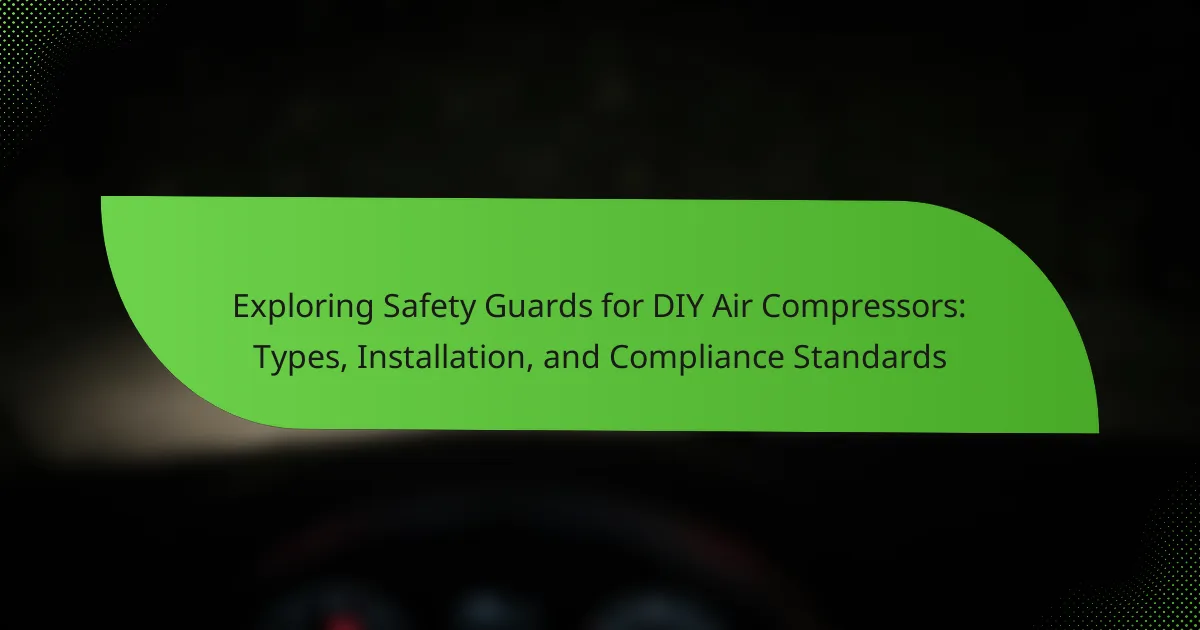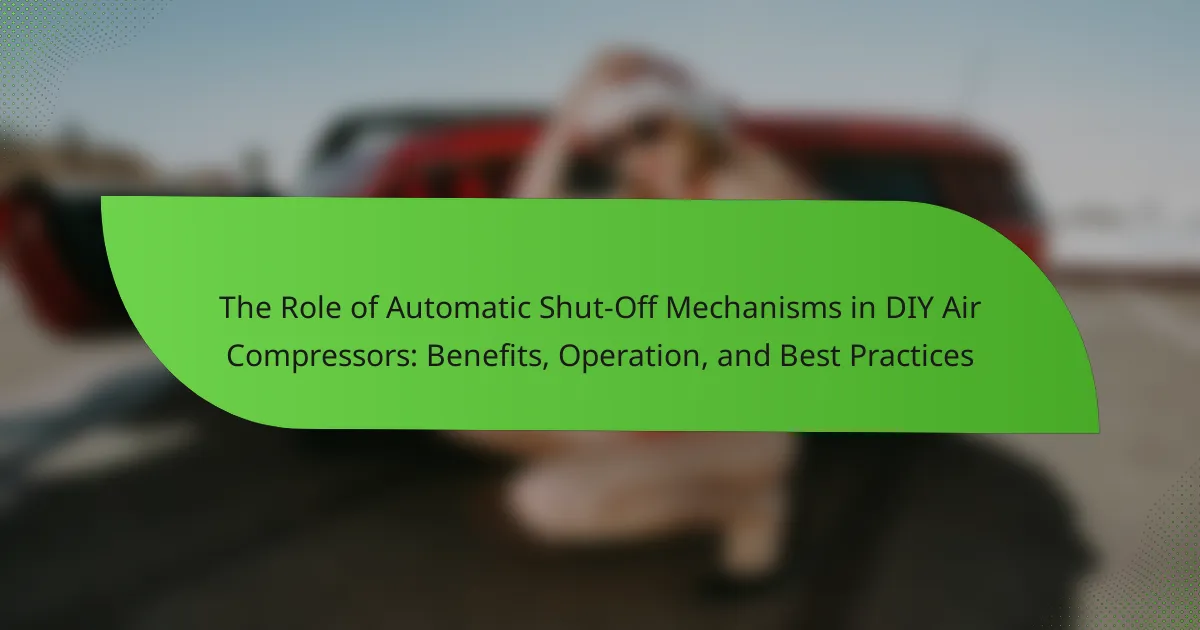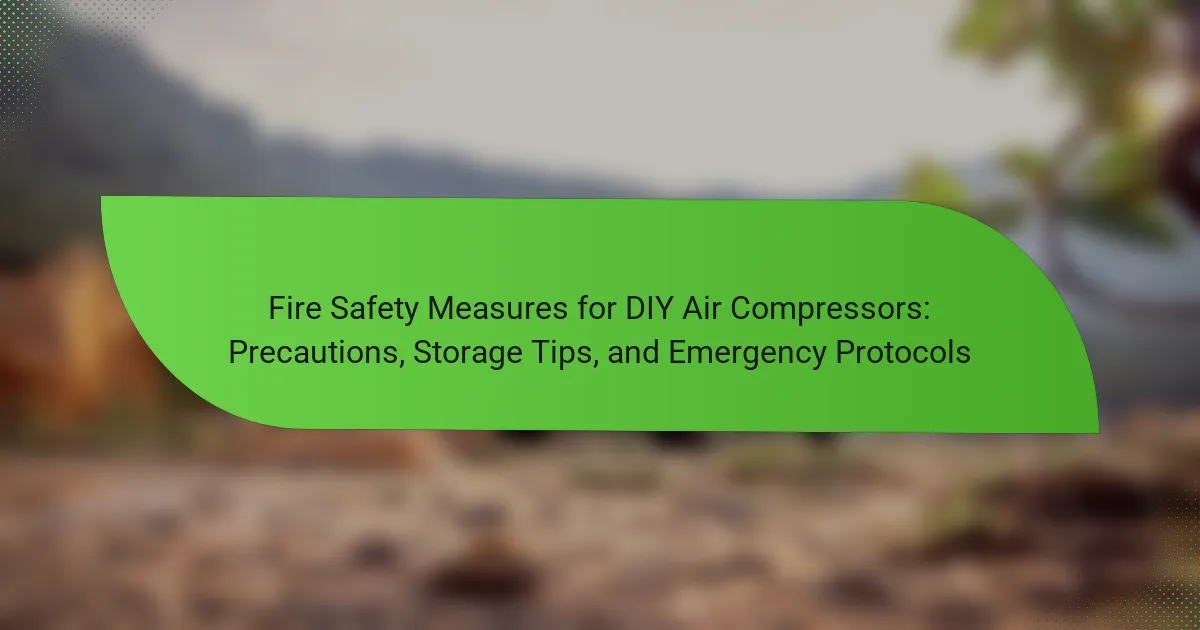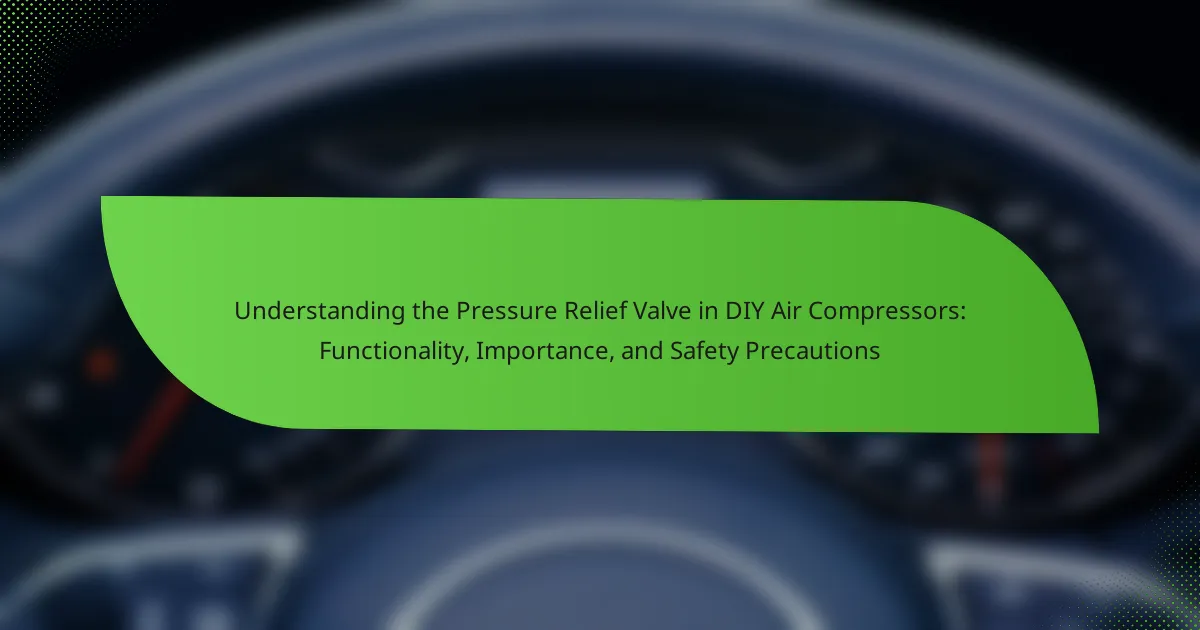Air filter systems are critical components in DIY air compressors, ensuring the intake of clean air to prevent contamination of internal parts. Contaminants can lead to wear and tear, reducing efficiency and increasing maintenance costs. The article highlights the importance of air filters in enhancing compressor performance, extending tool life, and improving the quality of compressed air output. It also addresses safety considerations, emphasizing the need for regular maintenance and proper filtration to prevent equipment failure and health risks associated with contaminated air. Overall, effective air filter systems play a vital role in maximizing the functionality and longevity of DIY air compressors.
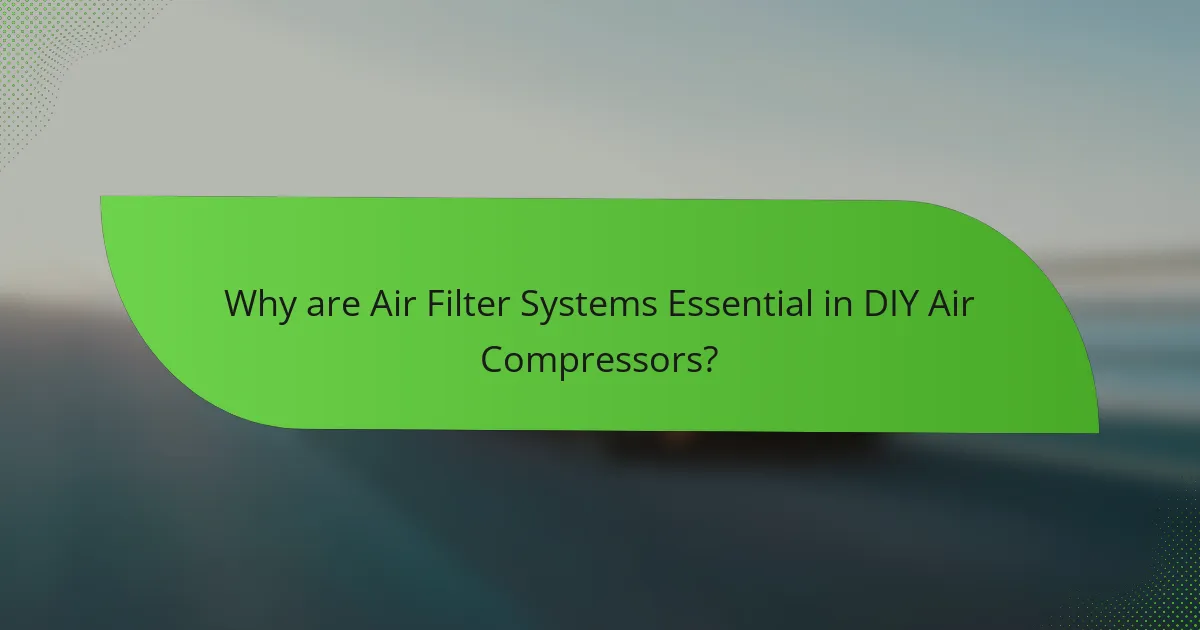
Why are Air Filter Systems Essential in DIY Air Compressors?
Air filter systems are essential in DIY air compressors to ensure clean air intake. Clean air prevents contamination of the compressor components. Contaminants can cause wear and tear on internal parts. This wear can lead to reduced efficiency and increased maintenance costs. Moreover, air filters improve the quality of the compressed air output. High-quality compressed air is crucial for tools and applications requiring precision. According to the Compressed Air and Gas Institute, contaminated air can reduce tool life by up to 50%. Therefore, incorporating air filter systems enhances both the longevity and performance of DIY air compressors.
How do Air Filter Systems contribute to the overall performance of DIY Air Compressors?
Air filter systems enhance the overall performance of DIY air compressors by ensuring clean air intake. Clean air reduces the risk of contaminants entering the compressor. Contaminants can cause wear and damage to internal components. This leads to longer operational life and reduced maintenance costs. Additionally, clean air improves efficiency by allowing the compressor to function optimally. Studies show that compressors operating with clean air can achieve up to 10% better efficiency. Therefore, air filter systems are crucial for maintaining performance and prolonging the lifespan of DIY air compressors.
What specific roles do Air Filter Systems play in maintaining air quality?
Air filter systems play a crucial role in maintaining air quality by removing pollutants and allergens from the air. They capture dust, pollen, smoke, and other particulate matter. This filtration process helps to reduce respiratory issues and allergies in individuals. Air filter systems also eliminate harmful gases and odors, contributing to a healthier indoor environment. According to the Environmental Protection Agency (EPA), proper air filtration can improve air quality significantly, reducing indoor air pollution levels. Regular maintenance of air filter systems ensures their effectiveness and longevity. This maintenance includes timely replacement of filters to maintain optimal performance. Overall, air filter systems are essential for achieving and sustaining good air quality in various settings.
How do Air Filter Systems enhance the lifespan of DIY Air Compressors?
Air filter systems enhance the lifespan of DIY air compressors by preventing contaminants from entering the compressor. These contaminants include dust, dirt, and moisture. Such particles can cause wear and tear on internal components. Over time, this wear can lead to decreased performance and potential failure. Air filters trap these harmful particles before they reach the compressor. This filtration process maintains cleaner internal environments. A cleaner environment reduces the frequency of maintenance needed. As a result, the overall operational efficiency improves, extending the compressor’s lifespan significantly.
What are the common types of Air Filter Systems used in DIY Air Compressors?
Common types of air filter systems used in DIY air compressors include particulate filters, coalescing filters, and activated carbon filters. Particulate filters remove dust, dirt, and other solid contaminants from the air. Coalescing filters are designed to separate water and oil from the compressed air. Activated carbon filters eliminate odors and volatile organic compounds (VOCs) from the air stream. Each filter type plays a crucial role in maintaining air quality and system efficiency. Proper filtration helps protect the compressor and tools from damage. Regular maintenance of these filters ensures optimal performance and extends the lifespan of the equipment.
What are the differences between mechanical and electronic air filters?
Mechanical air filters use physical barriers to capture particles from the air. They typically rely on materials like fiberglass or foam to trap dust, pollen, and other contaminants. Electronic air filters, on the other hand, use electrical charges to attract and capture particles. These filters can remove smaller particles than mechanical filters due to their charged plates.
Mechanical filters require regular replacement to maintain efficiency. Their effectiveness can diminish over time as they become clogged. Electronic filters can be cleaned and reused, offering a longer lifespan. However, they may require a power source to operate, which mechanical filters do not.
Overall, mechanical filters are simpler and often less expensive. Electronic filters tend to provide a higher level of filtration. Both types serve the purpose of improving air quality but differ in their mechanisms and maintenance needs.
How do different filter materials affect air filtration efficiency?
Different filter materials significantly impact air filtration efficiency. Materials such as fiberglass, pleated paper, and HEPA each have unique properties. Fiberglass filters are less efficient but cost-effective for larger particles. Pleated paper filters capture finer particles and have higher surface area for better airflow. HEPA filters provide the highest efficiency, capturing at least 99.97% of particles down to 0.3 microns. The choice of material directly influences the filter’s ability to trap contaminants. For example, a study by the American Society of Heating, Refrigerating and Air-Conditioning Engineers (ASHRAE) shows that HEPA filters outperform others in indoor air quality. Thus, selecting the right filter material is crucial for optimal air filtration.
What maintenance practices are necessary for effective Air Filter Systems?
Regular maintenance practices are essential for effective air filter systems. First, inspect the air filter frequently for dirt and debris. A clean filter optimizes airflow and enhances performance. Replace or clean filters based on manufacturer recommendations, typically every 1 to 3 months. Ensure the filter fits properly to prevent air leaks. Additionally, check the housing for any signs of damage or wear. Keep the surrounding area clean to minimize contaminants. Monitor the air quality and pressure levels regularly. These practices help maintain efficiency and prolong the lifespan of the air filter system.
How often should Air Filter Systems be cleaned or replaced?
Air filter systems should be cleaned or replaced every 1 to 3 months. This frequency can vary based on usage and environmental conditions. For instance, systems in dusty areas may require more frequent maintenance. Regular cleaning helps maintain airflow and efficiency. It also prevents the buildup of contaminants. Neglecting this maintenance can lead to reduced performance and higher energy costs. Following manufacturer guidelines ensures optimal operation. Regular checks can extend the lifespan of the air filter system.
What signs indicate that an Air Filter System needs maintenance?
Signs that an Air Filter System needs maintenance include reduced airflow and increased noise levels. When airflow decreases, it indicates that the filter is clogged. A clogged filter can lead to strain on the air compressor. Increased noise levels may suggest that the system is working harder due to a blocked filter. Visible dirt and dust accumulation on the filter also signal the need for maintenance. Additionally, frequent cycling of the compressor can indicate that the filter is not allowing adequate airflow. Regular checks can prevent these issues and maintain system efficiency.
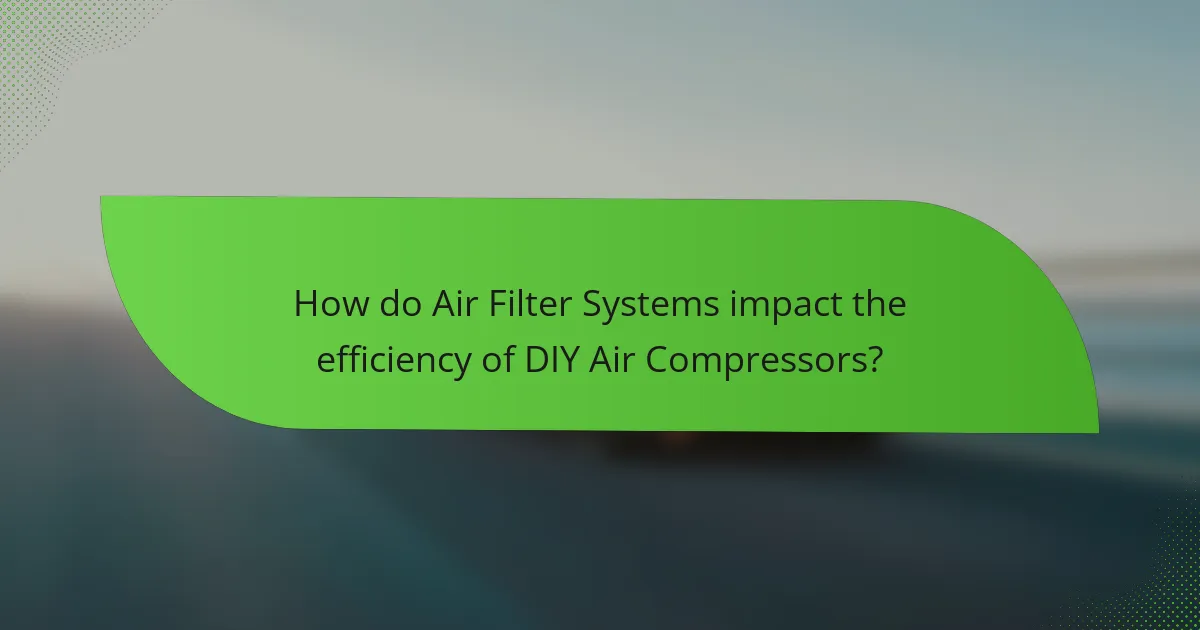
How do Air Filter Systems impact the efficiency of DIY Air Compressors?
Air filter systems significantly enhance the efficiency of DIY air compressors. They remove contaminants from the air intake, preventing clogging in the compressor components. Clean air intake leads to optimal performance and reduces energy consumption. According to a study by the American Society of Mechanical Engineers, compressors with efficient air filters can operate up to 15% more effectively. This efficiency translates to longer operational life and reduced maintenance costs. By ensuring a steady flow of clean air, air filter systems help maintain consistent pressure levels in the compressor. Thus, they play a crucial role in maximizing the overall functionality of DIY air compressors.
What factors influence the efficiency of Air Filter Systems?
The efficiency of air filter systems is influenced by several key factors. These include the filter media type, which affects particle capture efficiency. Higher quality media can trap smaller particles more effectively. The airflow rate through the filter also plays a crucial role. Higher rates can reduce filtration efficiency if the filter is not designed for it.
Filter design and surface area significantly impact performance. A larger surface area allows for better airflow and filtration. The presence of pre-filters can extend the life of main filters by capturing larger particles first. Maintenance frequency is essential; regular cleaning or replacement ensures optimal performance.
Environmental conditions, such as humidity and temperature, can also affect filter efficiency. Filters may become less effective in high humidity, leading to reduced air quality. Finally, the size and type of particles being filtered are critical. Different filters are designed for specific particle sizes and types.
How does filter clogging affect compressor performance?
Filter clogging significantly reduces compressor performance. Clogged filters restrict airflow, leading to increased pressure drops. This restriction forces compressors to work harder to maintain pressure. Consequently, energy consumption rises, resulting in higher operational costs. Additionally, reduced airflow can cause overheating, which may damage internal components. Studies show that a 20% reduction in airflow can decrease compressor efficiency by up to 30%. Regular maintenance of air filters is essential to prevent these issues and ensure optimal performance.
What role does airflow play in the efficiency of Air Filter Systems?
Airflow is crucial for the efficiency of air filter systems. It determines how effectively contaminants are captured. High airflow rates can enhance filtration but may also reduce the filter’s lifespan. Conversely, low airflow can lead to inadequate filtration and increased pressure drop. The optimal balance of airflow ensures maximum contaminant removal while maintaining system performance. Studies show that filters operating within their designed airflow range perform best in trapping particles. Maintaining proper airflow improves overall air quality and system longevity.
How can users optimize Air Filter Systems for better efficiency?
Users can optimize air filter systems for better efficiency by regularly replacing filters. Dirty filters restrict airflow and reduce system performance. It is recommended to check filters monthly and replace them every three months. Users should also ensure proper sealing around filters to prevent air leaks. This improves the system’s ability to filter air effectively. Additionally, selecting the right filter type for specific applications enhances efficiency. High-efficiency particulate air (HEPA) filters capture smaller particles, improving air quality. Regular maintenance of the air compressor itself also contributes to overall efficiency. Keeping the compressor clean and lubricated reduces wear and tear. Following these practices can lead to a noticeable improvement in air filter system performance.
What adjustments can be made to improve airflow through filters?
To improve airflow through filters, consider increasing the filter surface area. Larger surface areas allow for greater airflow while reducing resistance. Additionally, using filters with lower MERV ratings can enhance airflow. Lower MERV filters capture fewer particles, which can facilitate better airflow. Regular maintenance, such as cleaning or replacing filters, also plays a crucial role. Clogged filters significantly hinder airflow. Ensuring proper installation and alignment of filters prevents air leaks. Air leaks can reduce the efficiency of airflow. Lastly, optimizing the design of the filter housing can improve airflow dynamics. A well-designed housing minimizes turbulence and maximizes airflow efficiency.
How do environmental conditions affect filter performance and efficiency?
Environmental conditions significantly impact filter performance and efficiency. Factors such as temperature, humidity, and particulate matter concentration directly influence how well filters operate. High temperatures can cause filter materials to degrade, reducing their effectiveness. Increased humidity may lead to moisture accumulation, promoting mold growth and clogging filters. Elevated levels of particulate matter can overwhelm filters, leading to faster saturation and decreased airflow. Research indicates that filters exposed to extreme environmental conditions may require more frequent replacements to maintain optimal performance. For instance, a study by the American Society of Heating, Refrigerating and Air-Conditioning Engineers found that filters in dusty environments lost efficiency up to 50% more quickly than those in cleaner settings.
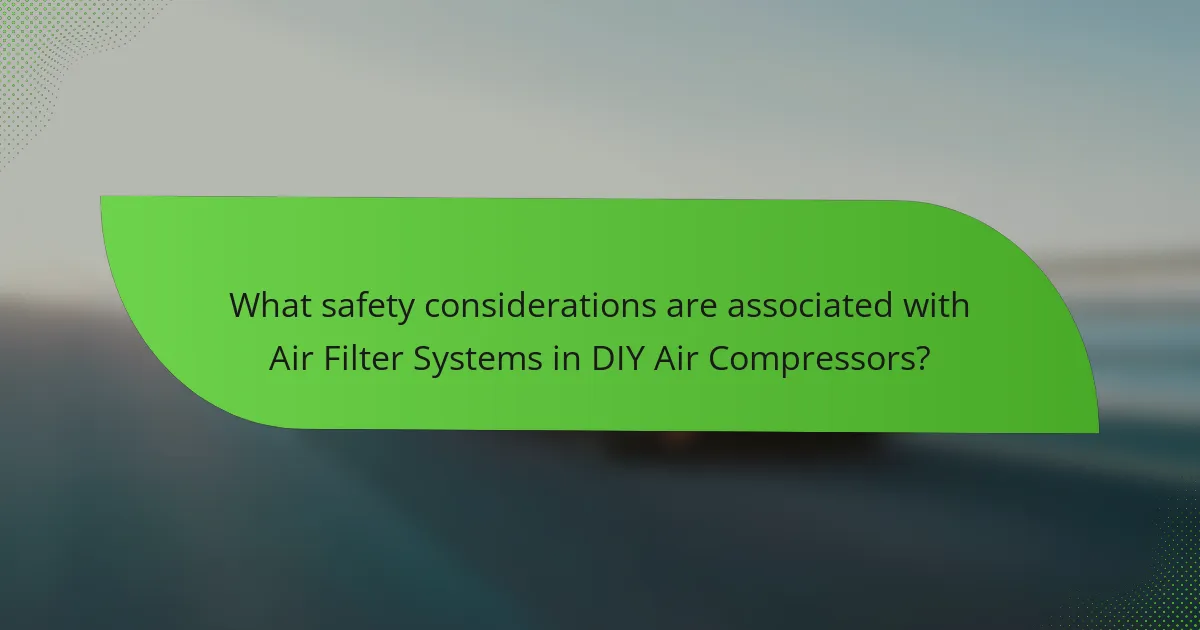
What safety considerations are associated with Air Filter Systems in DIY Air Compressors?
Air filter systems in DIY air compressors present several safety considerations. Proper filtration prevents harmful particles from entering the compressor, which can lead to equipment failure. Clogged filters can cause pressure build-up, increasing the risk of explosions. Regular maintenance of air filters is crucial to ensure optimal performance and safety. Filters should be inspected and replaced according to manufacturer guidelines. Using the correct filter type is essential for compatibility with the compressor’s specifications. Inadequate filtration can lead to respiratory issues for users exposed to contaminated air. Ensuring that air filters are sealed correctly prevents leaks that could compromise safety.
How do Air Filter Systems contribute to user safety during operation?
Air filter systems contribute to user safety during operation by removing harmful contaminants from the air. These contaminants can include dust, pollen, and volatile organic compounds. By filtering these particles, air filter systems reduce the risk of respiratory issues for users. Clean air also minimizes the chances of equipment malfunction due to debris accumulation. Studies show that proper filtration can enhance air quality by up to 99%. This significant improvement in air quality directly correlates with increased user safety and comfort during operation.
What risks are associated with using a DIY Air Compressor without an effective air filter?
Using a DIY air compressor without an effective air filter poses several risks. Contaminants can enter the air system, leading to damage to internal components. Dust and moisture can corrode metal parts, reducing the compressor’s lifespan. Additionally, unfiltered air can lead to poor performance in tools and equipment. This can result in inefficient operation and increased wear and tear. The lack of filtration may also allow harmful particles to be released into the air, posing health risks to users. Lastly, it can create safety hazards due to potential equipment failure during operation.
How can proper maintenance of Air Filter Systems prevent accidents?
Proper maintenance of Air Filter Systems can prevent accidents by ensuring optimal air quality and equipment functionality. Clean air filters reduce the risk of airborne contaminants that can lead to equipment failure. Regular inspections identify blockages that may cause pressure buildup, a common cause of accidents. Additionally, well-maintained filters improve airflow, enhancing the efficiency of DIY air compressors. According to industry standards, neglected filters can reduce compressor efficiency by up to 30%. This inefficiency may lead to overheating and potential system failures. By maintaining air filters, users can significantly reduce the likelihood of accidents and ensure safer operation.
What best practices should users follow for safe operation of Air Filter Systems?
Users should regularly check and replace air filter systems to ensure optimal performance. Regular maintenance prevents clogging and maintains airflow efficiency. Users should also ensure that the system is installed according to manufacturer guidelines. Proper installation minimizes risks of malfunction. Additionally, users should clean the filters as recommended, usually every few months. Cleaning extends the lifespan of the air filter system. Users must monitor for unusual noises or performance issues. Prompt attention to these signs can prevent further damage. Lastly, ensure that the filter is compatible with the specific air compressor model. Compatibility is crucial for safe and effective operation.
How can users ensure their Air Filter Systems are installed correctly?
Users can ensure their Air Filter Systems are installed correctly by following the manufacturer’s guidelines. These guidelines typically include specific installation steps and requirements. Users should also check for proper alignment of the filter with the housing. Ensuring a tight seal is essential to prevent air leaks. Additionally, users should verify that the airflow direction matches the indicated arrows on the filter. Regular inspections after installation can help identify any potential issues. Proper installation contributes to the efficiency and effectiveness of the air compressor system. Accurate installation can also enhance safety by preventing contaminants from entering the system.
What precautions should be taken when replacing or cleaning filters?
When replacing or cleaning filters, ensure the air compressor is powered off and unplugged. This prevents accidental start-up during maintenance. Wear protective gloves and a mask to avoid inhaling dust or debris. Inspect the filter for damage before cleaning or replacing it. Use a vacuum or compressed air to remove loose particles. Dispose of old filters according to local regulations. Follow the manufacturer’s guidelines for specific cleaning or replacement procedures. Regular maintenance enhances the efficiency and lifespan of air filter systems.
What troubleshooting tips can help maintain Air Filter Systems in DIY Air Compressors?
Regularly inspect air filter systems for dirt and debris. Clean or replace filters as needed to ensure optimal airflow. Check for leaks in the air filter housing. Tighten any loose connections to prevent air loss. Monitor the compressor’s pressure gauge for abnormal readings. Adjust the regulator if pressure is inconsistent. Ensure the intake area is free from obstructions. This promotes proper air circulation and efficiency.
The main entity of the article is air filter systems, specifically their role in DIY air compressors. The article emphasizes the essential function of air filter systems in maintaining clean air intake, which prevents contamination and enhances the longevity and efficiency of compressors. Key topics include the types of air filters, their maintenance practices, and the impact of air quality on user safety and equipment performance. Additionally, the article discusses how proper filtration can significantly reduce operational costs and improve overall compressor functionality.
